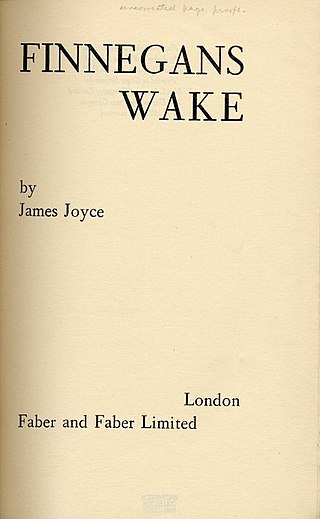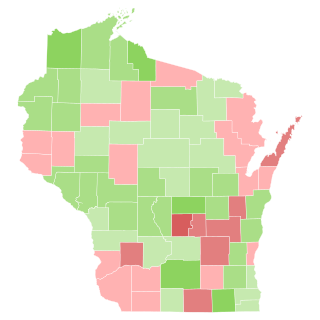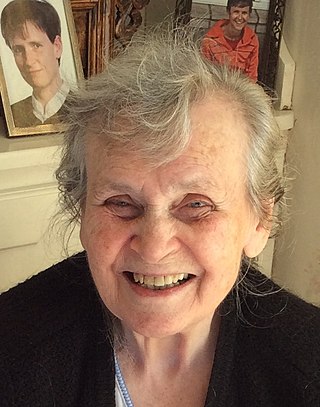The identity of the longest word in English depends on the definition of a word and of length.

Humpty Dumpty is a character in an English nursery rhyme, probably originally a riddle and one of the best known in the English-speaking world. He is typically portrayed as an anthropomorphic egg, though he is not explicitly described as such. The first recorded versions of the rhyme date from late eighteenth-century England and the tune from 1870 in James William Elliott's National Nursery Rhymes and Nursery Songs. Its origins are obscure, and several theories have been advanced to suggest original meanings.

Finnegans Wake is a novel by Irish writer James Joyce. It is known for its allusive and experimental style and its reputation as one of the most difficult works in literature. In 1924, it began to appear in installments under the title "fragments from Work in Progress". The final title was only revealed when the book was published on 4 May 1939.
"Finnegan's Wake" is an Irish-American comic folk ballad, first published in New York in 1864. Various 19th-century variety theatre performers, including Dan Bryant of Bryant's Minstrels, claimed authorship but a definitive account of the song's origin has not been established. An earlier popular song, John Brougham's "A Fine Ould Irish Gintleman," also included a verse in which an apparently dead alcoholic was revived by the power of whiskey.

Mr. Dressup is a Canadian children's television series, starring Ernie Coombs, a former understudy of Fred Rogers, in the title role. It ran on CBC from 1967 to 1996, soon becoming an iconic presence in Canadian media.
"For He's a Jolly Good Fellow" is a popular song that is sung to congratulate a person on a significant event, such as a promotion, a birthday, a wedding, a retirement, a wedding anniversary, the birth of a child, or the winning of a championship sporting event. The melody originates from the French song "Malbrough s'en va-t-en guerre".

Harriet Shaw Weaver was an English political activist and a magazine editor. She was a significant patron of Irish writer James Joyce.

Philip Stuart Kitcher is an English philosopher who is the John Dewey Professor Emeritus of philosophy at Columbia University. He specialises in the philosophy of science, the philosophy of biology, the philosophy of mathematics, the philosophy of literature, and more recently pragmatism.
Work in progress or work in process is the general description of a partially finished project.
Michael Finnegan or Finnigan may refer to:
John Lawrence Finneran, better known under his stage name Larry Finnegan, was an American pop singer.
The Ballad of Persse O'Reilly is a song in book one of James Joyce's novel Finnegans Wake, where the protagonist H.C.E. has been brought low by a rumour which begins to spread across Dublin, apparently concerning a sexual trespass involving two girls in Phoenix Park; however details of HCE's transgression change with each retelling of events. Most of chapters 1.2 through 1.4 follow the progress of this rumour, starting with HCE's encounter with "a cad with a pipe." The cad asks the time, but HCE misunderstands it as either an accusation or a proposition, and incriminates himself by denying rumours the cad has not yet heard.
Roaratorio, an Irish circus on Finnegans Wake is a musical composition by American avant-garde composer John Cage. It was composed in 1979 for Klaus Schöning of West German Radio, and premiered as one of the entries in Schöning's radio series.

Giusto Fernando Tenducci, sometimes called "il Senesino", was a male soprano (castrato) opera singer and composer, who passed his career partly in Italy but chiefly in the United Kingdom.

The Magdalene Laundries in Ireland, also known as Magdalene asylums, were institutions usually run by Roman Catholic orders, which operated from the 18th to the late 20th centuries. They were run ostensibly to house "fallen women", an estimated 30,000 of whom were confined in these institutions in Ireland.
Waywords and Meansigns: Recreating Finnegans Wake [in its whole wholume] is an international project setting James Joyce's novel Finnegans Wake to music. Waywords and Meansigns has released two editions of audio, each offering an unabridged musical adaptation of Joyce's book. A third edition, featuring over 100 artists and performing much shorter passages of the book, debuted May 4, 2017.
Bellsybabble is the name of the language of the Devil, mentioned by writer James Joyce in the following postscript to a letter, which he wrote in 1936 to his four-year-old grandson:
The devil mostly speaks a language of his own called Bellsybabble which he makes up himself as he goes along but when he is very angry he can speak quite bad French very well though some who have heard him say that he has a strong Dublin accent.

The 1940 United States Senate election in Wisconsin was held on November 5, 1940.
Finnegan is an Irish surname coming from the Gaelic Ó Fionnagáin, meaning "son of fairhaired", or Fionnagán, from the diminutive personal name of Fionn, meaning "fairhaired".

Ruth Hilary Finnegan is a Northern Irish linguistic anthropologist and Emeritus Professor of the Open University.








